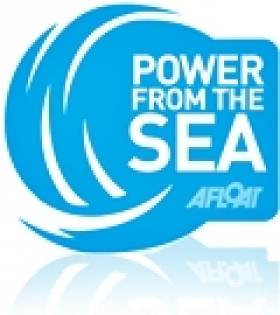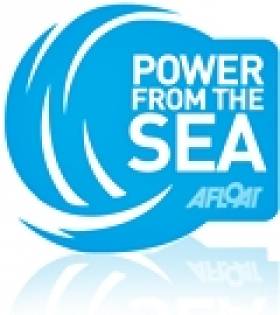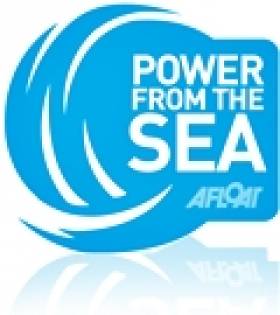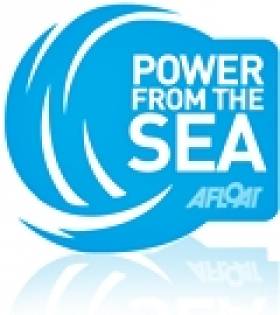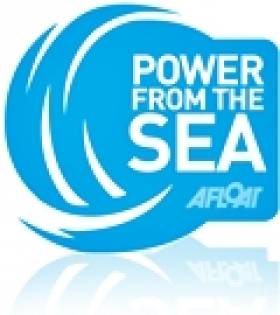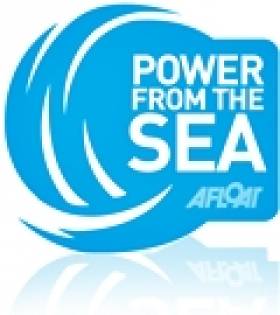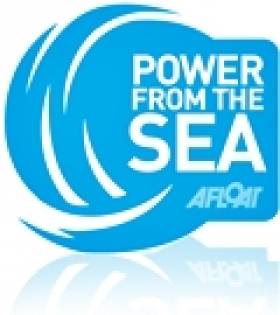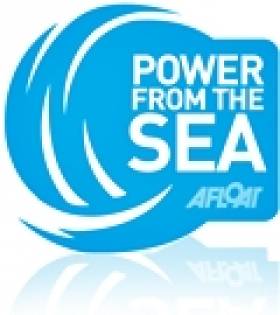Displaying items by tag: Power from the Sea
More Millions For Ocean Energy Research In Budget 2016
#Budget2016 - Ocean energy research will receive a further €4.5 million boost in next year's Budget, as announced by the Department of Communications, Energy and Natural Resources.
The funding follows from last year's €10 million allocation to ocean energy research, after the publication of the Offshore Renewable Energy Development Plan in early 2014.
A total of €68 million has been allocated for energy efficiency and renewable energy in 2016 as revealed in Tuesday's Budget.
And a further €9 million is being provided for geoscience initiatives including the INFOMAR and TELLUS programmes, which will support expanded geoscience research in Ireland’s offshore and onshore.
INFOMAR researchers recently helped reveal the remains of World War I shipwrecks, some of which have not been seen since the boats went down a century ago.
Ireland Needs Reliable 'Blue Growth' Stats As Marine Sector Outperforms General Economy, Spurs Innovations
#MarineIndustry - With Ireland's maritime industry definitively outperforming the general economy since the global financial crisis began, "reliable statistics" on the sector are needed to understand how the health of our waters and coastline affects the country as a whole.
That's the impetus behind new research being conducted by the Socio-Economic Marine Research Unit (Semru) at NUI Galway, together with Teagasc, to determine the indirect impact of Ireland's marine economy on the country's broader growth, as the Irish Examiner reports.
The collaboration has already produced what they call the Bio-Economy Input-Output Model, which studies the connections between Ireland’s marine and agriculture sectors and the rest of the economy – and has indicated that for every €100 in marine sector turnover, another €78 is generated across other economic sectors.
With those kinds of results, it's no surprise that Ireland's waters and coastline are being embraced as "a national asset providing incredible opportunities for tourism, energy, food and new applications for therapeutics and technology,” according to Marine Institute chief executive Dr Peter Heffernan.
“We’re building marine research infrastructure that will support and promote the development of the technology we need to harness that energy," he added. "We’re in an ideal position to become a leader in the development of ocean energy technology.”
Indeed, this prime time for Ireland's renewable energy potential was the spur for a UCC spin-out company to license a new financial modelling and analytics tool for the offshore wind and tidal power sectors.
Exceedence Ltd, founded and led by Dr Ray Alcorn, will now bring to market the ExceedenceFINANCE solution, developed by software engineers, financial analysts, industry specialists and researchers in the Marine Renewable Energy Ireland (MaREI) centre at UCC Beaufort.
“Our software analyses the viability of potential renewable projects and helps to make intelligent decisions on where and when these projects should proceed," explains Dr Alcorn.
The software is designed to help "a wide range of stakeholders" from State agencies, investors, engineers and developers "to create renewable energy infrastructure that can address the need for low or no-carbon energy within Ireland and abroad", according to University College Cork’s VP of research and innovation, Prof Anita Maguire
"This technology is very significant for the blue economy, in Ireland and internationally. We are delighted to see Exceedence develop commercially with the objective of supporting the marine industry and ultimately creating jobs.”
Marine Renewable Energy Sector Worth €9 Billion by 2030
#powerfromthesea – Ireland's marine renewable energy sector could ultimately be worth as much as €9 billion by 2030, and be supporting thousands of jobs on the island, according to Energy Minister Alex White. Speaking at the Marine Renewable Energy Ireland (MaREI) Industry Day, in Ringaskiddy, Co. Cork, Minister White also said his department's support for research and development in ocean renewables would increase by almost €17 million between 2013 and 2016, bringing it to over €26 million.
Minister White said Ireland had the potential to become the international focal point of the international marine renewable industry. He was in Ringaskiddy to perform the 'topping out' ceremony at the UCC Beaufort Building, which will be the hub of the Marine Renewable Energy Ireland (MaREI)from summer 2015. With up to 135 researchers, the Beaufort laboratory will house the world's largest group of marine renewable energy researchers.
Minister White said: "Ireland has a landmass of around 90,000 square kilometres. Our sea area is ten times that size, and it represents one of the best offshore renewable energy resources in the world. The development of Ireland's marine renewable energy sector will contribute to the generation of carbon-free renewable electricity. In the process, it will enhance the security of Ireland's energy supply, deliver green growth, and add to the 47,000 jobs already supported by Ireland's energy sector.
"Over time, the introduction of ocean energy into Ireland's renewables portfolio will result in an indigenous ocean sector with significant economic and employment benefits. You and your industry will be central to making these potential benefits a reality. Exchequer support for ocean research, development and demonstration has been increased. Between 2013 and 2016, €16.8 million was added to my Department's multi-annual ocean energy development budget, bringing the total cumulative funding to €26.3 million."
Minister White quoted the Sustainable Energy Authority of Ireland and Invest Northern Ireland, whose recently-published Economic Study for Ocean Energy Development in Ireland found that a fully-developed ocean energy sector could be worth as much as €9 billion, and be sustaining many thousands of jobs on this island, by 2030.
Minister Sean Sherlock in 2013, announced €19 million in SFI funding for MaREI, when he was Minister for Research and Innovation. This was matched by €10.5 million in industry funding.
Marine Energy Activities Boosted With Extra €4.2m in EU Funding
#powerfromthesea – Minister for Communications, Energy & Natural Resources Alex White T.D. welcomed the announcement that the SFI Centre for Marine Renewable Energy Ireland (MaREI) had successfully raised an additional €4.2 million in funding from EU research funds for marine energy activities.
The announcement of the substantial EU funding was made to an audience of more than 130 industry and university representatives involved in a variety of marine energy research projects, attending the MaREI Industry Open Day at the National Maritime College of Ireland in Cork.
"I want to commend MaREI on their success in securing substantial EU support to fund their very important research and development work. It is truly laying the foundations for both the energy system and economic opportunity of the future."
Speaking at the MaREI Industry Open Day, Prof. Mark Ferguson, Director General Science Foundation Ireland (SFI) and Chief Scientific Adviser to the Government of Ireland added, "MaREI is one of twelve SFI Research Centres of excellence and impact in Ireland. Research undertaken at MaREI is positioning Ireland to play a leading role in marine renewable energy research which is an area of significant national strategic importance. In its first year MaREI has delivered on the targets which we have set. I look forward to a successful year ahead for MaREI, in terms of new industry partnerships, leveraging funding and new discoveries that will deliver solutions that can benefit both Irish society and the economy."
Prof. Conchúr Ó Brádaigh, Director of the MaREI Centre said that "Large and small companies alike are engaging with MaREI across a huge variety of business opportunities from marine robotics and new materials to endure ocean conditions, to offshore wind, wave and marine energy and mooring devices as well as aquaculture and grid technology solutions. The additional funding from the EU will serve to further position MaREI at the forefront of marine renewable research and commercialisation of this research globally."
The industry-academia MaREI Centre comprises over 45 industry partners, including global market leaders in energy, marine technology, software and hardware providers. Academic partners include lead partner University College Cork along with Cork Institute of Technology, University of Limerick, NUI Galway, NUI Maynooth, University College Dublin and the Marine Institute.
"MaREI will directly create companies and jobs and serve as a catalyst for Ireland to establish a safe, sustainable and profitable energy supply for domestic use and for export," said Professor Anita Maguire, Vice-President for Research and Innovation at University College Cork.
Minister Alex White also toured the €15 million UCC Beaufort building, performing the customary "topping out" ceremony, which marks the final phase of building works. Beaufort will house the MaREI centre on its completion in July 2015.
The MaREI Centre initially received government support of €19 million through Science Foundation Ireland (SFI) and a further €10.5 million investment from industry partners. The Centre supports job creation in the in marine renewables sector, while also making Ireland an international focus for the marine energy industry. Almost 90 jobs in the field of marine energy and maritime projects were recently announced by Minister for Agriculture, Food, Marine and Defence Simon Coveney, T.D. for the Cork Harbour region, and MaREI is heavily involved in supporting these companies and the related jobs.
Scottish Tidal Energy Scheme Gets Green Light From Financiers
#SeaPower - What's been described as the world's largest planned tidal energy scheme has been given the green light by its financiers, with construction set to begin off the northern Scottish coast in the new year, as The Guardian reports.
Previously detailed last month on Afloat.ie, the MeyGen project – comprising 269 turbines on the seabed off Caithness in the far north of mainland Scotland – will see onshore construction get under way next month after developers Atlantis Resources satisfied the conditions to draw down funds from The Crown Estate of Scottish Enterprise.
MeyGen aims to harness the strong currents at the Ness of Quoys in Pentland Firth to generate energy at levels "on a part with wind turbines" but hidden from view beneath the waves - with the first power from the sea to be delivered to Britain's national grid by 2016.
Scottish Firm Taking Wind Farms Underwater
#PowerFromTheSea - The next big renewable energy turbine farm could be underwater off the coast of Scotland, as MailOnline reports.
Scottish firm MayGen has big plans to install a £51 million (€65.2 million) underwater turbine project to harness the powerful currents of their country's coastal waters.
This new project, earmarked for Pentland Firth at Caithness in the far north of mainland Scotland, follows separate plans to install the world's largest tidal power facility in the Sound of Islay.
MayGen - which has just won an award for its parent company Atlantis Resources for its "significant contribution" to the marine renewables industry – says its state-of-the-art technology is "on a par with wind turbines" in terms of productivity, but would be hidden from the view of those who find the larger land-based wind farms unsightly.
The Pentland Firth project will be the new design's proving ground, with hopes that it will generate power for nearly half a million homes upon completion in 2020.
MailOnline has more on the story HERE.
High-Tech Green Seismic Vessel in Cork Harbour Prior to Largest Ever Oil-Gas Off-Shore Irish 3D Survey
#OilExploration – Polarcus Amani, claimed to be one of the most greenest seismic vessels in the world is to embark on one of the largest ever 3D seismic surveys offshore of Ireland reports Cork Harbour.ie
The ultra-modern, super high ice-class, 3D seismic vessel which visited Foynes last year has returned to Irish waters. She is a design from the Norwegian based Ulstein Group which has incorporated a wealth of environmental features on the vessel completed in 2012 which is to tow a seismic array behind of approximately 1.4 km width by 8 km length.
The focus of the survey is in the southern Porcupine Basin, where Polarcus will acquire a minimum area of 4,300 km2, providing coverage over Providence Resources' Drombeg exploration prospect and adjacent acreage on offer in the 2015 Atlantic Margin Oil and Gas Exploration Licensing Round.
As previouly reported on Afloat.ie, Minister for Communications, Energy and Natural Resources, Pat Rabbitte T.D. at the recent Our Ocean Wealth conference announced taxation provisions relating to petroleum exploration and production are to be revised upwards to provide for an increased financial return to the State from discoveries made under future exploration licences and licensing options.
Also reported on Afloat.ie, Cork Harbour is strategically placed as an exploration base for the oil and gas energy industry with potential resources within our territorial waters.
Existing facilities such as the ship repair and maintenance could be expanded to be part of this sector.
Since the foundation of the Irish Maritime and Energy Resource Cluster (IMERC) located in Ringaskiddy, the cluster is the epicentre in promoting Ireland as a world-renowned research centre to unlock our maritime and energy potential.
Highly-specialised vessels such as those from the Polarcus fleet can use the natural harbour as a base for loading supplies, equipment and take on bunkers, where tanker Mersey Spirit is also berthed today at Ringaskiddy deepwater berth.
OpenHydro Sees Big Future In Channel Islands Tidal Power
#OpenHydro - The Irish Times has a report on OpenHydro's new €600 million deal with a Channel Islands company that's set to establish one of Europe's biggest renewable energy schemes.
Dublin-based hydro-power firm OpenHydro - which earlier this year gave a controlling stake to French naval defence giant DCNS for a €130 million investment - has teamed up with Alderney Renewable Energy to set up a new company called Race Tidal that aims to generate 300MW of power for export to Britain and France.
The project would take advantage of the strong tidal waters off Alderney, the northernmost of the Channel Islands, which OpenHydro CFO Peter Corcoran says have a potential capacity of 3GW.
The long-term project requires obtaining all necessary permits, expected to take four years, followed by two more years of construction and installation of OpenHydro's turbines.
The Irish Times has more on the story HERE.
Green Energy Firm's Irish Sea Survey Gets EU Funding
#SeaPower - Green energy multinational Mainstream Renewable Power has secured €1.4 million in EU funding towards its costs of surveying the Irish Sea bed, as The Irish Times reports.
Mainstream's survey, planned to commence in 2014, will determine the route for undersea power cabling to link Irish offshore wind farms to Britain's national grid - with plans to export 1,200 megawatts to the UK annually from 2018.
The Irish Times as more on the story HERE.
Galway In Sights Of Wave Energy Firms Seeking Atlantic Power
#SeaPower - The power of the Atlantic Ocean will be put to the test next year as firms are in discussion to place wave energy devices in Galway Bay.
The Irish Independent reports that the Sustainable Energy Authority of Ireland (SEAI) is in discussion with "at least" three renewable energy companies to install massive machines to harness the power of the strong Atlantic currents off Galway.
Galway Bay is already a testing site for a number of quarter-scale wave energy prototypes that themselves can measure up to 30m long - and may resemble the enormous wave energy 'harvesters' being tested elsewhere that are changing the face of renewable energy.
It's hoped that wave power could meet up to 75% of Ireland's growing energy needs in the near future, though the technology to achieve this is still very much in development.



























